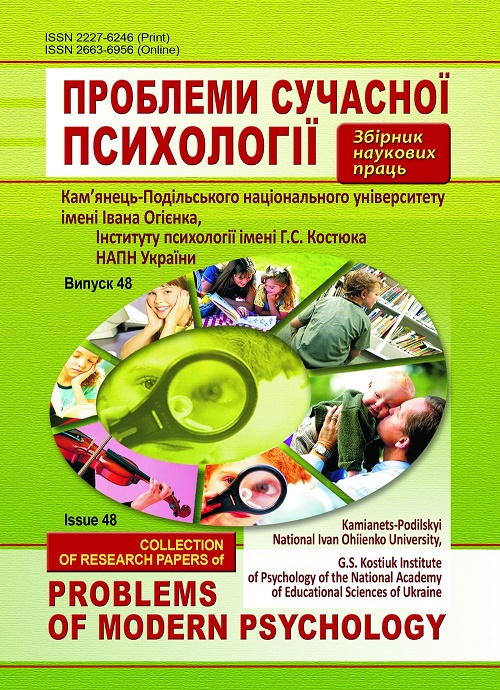Смислова архітектоніка свідомості й екзистенціально-системний концепт реорганізації «картини світу» майбутніх психологів-консультантів
DOI:
https://doi.org/10.32626/2227-6246.2020-48.154-174Ключові слова:
смисл, «життєвий стиль», «картина світу», екзистенціально-системний концепт, еволюціонування, майбутні психологи-консультанти.Анотація
У статті висвітлено специфіку смислової архітектоніки свідомості майбутніх психологів-консультантів та окреслено екзистенціально-системний підхід реорганізації їх «картини світу». «Картина світу» майбутніх психологів-консультантів досліджувалася з використанням таких методів: методу «Найраніший дитячий спогад» А. Адлера; методики Ф. Фідлера «Тип установки щодо інших»; моделювання «семантичних універсалій» «картини світу» за О. Ю. Артем’євою. Результати дослідження. Проведено аналіз чотирьох складових смислової динаміки «картини світу» досліджуваних, зокрема: становлення «картини світу»; відношення між суб’єктивною моделлю світу й об’єктивним світом; плану змісту та функціонування «картини світу»; розвитку або реорганізації «картини світу». Визначено структуру значущих зв’язків світу досліджуваних і патернів, які вони використовують. Такими атракторами установлено: засоби осягнення «Світу» як джерела страху, суму, сорому, гніву, відрази для підтвердження власних значень відносно суб’єктивного його образу; поведінкові програми уникнення, прохання про допомогу, приєднання, руйнації, відкидання як засоби підтвердження налаштованих зв’язків і засобів взаємодії зі «Світом»; ситуативно-суб’єктивний і нейтрально-байдужий типи установки щодо інших як налаштовані й найефективніші форми взаємовідношення між «Я» і «Світом»; контекстні семантичні універсалії «ресурс та інтенція» і «динаміка» як ґенези розвитку та сили особистісної системи. Охарактеризовано екзистенціально-системний підхід реорганізації смислової архітектоніки майбутніх психологів-консультантів, який передбачає не тільки розширення горизонту бачення себе і світу як дослідження, визначення і прийняття власних експертних зон, а й пошук і встановлення смислових взаємозв’язків між елементами системи завдяки розвитку багатомірності психологічного бачення себе і світу. Висновок. Запропонована діагностична схема дослідження «картини світу» майбутніх психологів-консультантів забезпечила побудову смислової моделі взаємовідношень конструктів «Я» та «Світ» і розкрила парафермальний досвід конструювання досліджуваними власної архітектоніки смислів з урахуванням її ґенезису та первісних складових. Екзистенціально-системний підхід у силу мультипарадигмальних методологічних засад і завдань інтегрувати минулий досвід із безмежною власною інтенціальністю, в силу інтрапсихічного фокусу трансформаційної роботи та предметної спрямованості може розглядатися як ефективний концепт творчої зміни «кристалізованих» патернів, відкриття нових векторів життєвих змін, самореорганізації й еволюціонування.
Посилання
Агафонов А. Ю. Основы смысловой теории сознания. Санкт-Петербург : Речь, 2003. 296 с.
Артемьева Е. Ю. Психология субъективной семантики. Москва : Наука, 1999. 137 с.
Бескова И. А. Эволюция и сознание: когнитивно-символический ана¬лиз. Москва : ИФ РАН, 2001. 179 c.
Бьюдженталь Дж. Искусство психотерапевта. Санкт-Петербург : Питер, 2001. 304 с.
Каліщук С. М. Методика Фреда Е. Фідлера та вірогідність зміни уста¬новки особистості щодо інших. Вісник Харківського національно¬го педагогічного університету імені Г. С. Сковороди. Психологія. 2014. Вип. 48. С. 112–122.
Леонтьев Д. А. Синергетика и личность: к неравновесной персонологии. Методология и история психологии. 2018. Вып. 3. С. 96–104.
Морен Э. Метод: Природа природы. Москва : Канон+, 2013. 464 с.
Сидоренко Е. В. Терапия и тренинг в концепции Альфреда Адлера. Санкт-Петербург : Речь, 2002. 347 с.
Шнайдер К. Пробуждаясь к трепету. Опыт глубинной трансформации – истории из жизни. Москва : Корвет, 2015. 224 с.
Adler, A. (1932). What life should mean to you. London : George Allen & Unwin Ltd. 300 p.
Fidler, F. (1968). Personality and situational determinants of leadership effectiveness. Group dynamics. Research and theory. New York : Harper & Brothers. P. 137–149.
##submission.downloads##
Опубліковано
Як цитувати
Номер
Розділ
Ліцензія
Редакція має повне право публікувати у Збірнику оригінальні наукові статті як результати теоретичних і експериментальних досліджень, які не знаходяться на розгляді для опублікування в інших виданнях. Автор передає редколегії Збірника права на розповсюдження електронної версії статті, а також електронної версії англомовного перекладу статті (для статей українською та російською мовою) через будь-які електронні засоби (розміщення на офіційному web-сайті Збірника, в електронних базах даних, репозитаріях та ін).
Автор публікації зберігає за собою право без узгодження з редколегією та засновниками використовувати матеріали статті: а) частково чи повністю в освітніх цілях; б) для написання власних дисертацій; в) для підготовки абстрактів, доповідей конференцій та презентацій.
Автор публікації має право розміщувати електронні копії статті (у тому числі кінцеву електронну версію, завантажену з офіційного web-сайту Збірника) на:
- персональних web-ресурсах усіх Авторів (web-сайти, web-сторінки, блоги тощо);
- web-ресурсах установ, де працюють Автори (включно з електронними інституційними репозитаріями);
- некомерційних web-ресурсах відкритого доступу (наприклад, arXiv.org).
Але в усіх випадках обов’язковою є наявність бібліографічного посилання на статтю або гіперпосилання на її електронну копію, що містяться на офіційному сайті Збірника.






